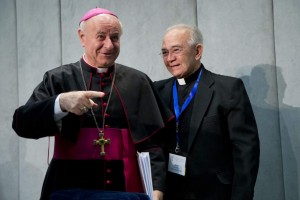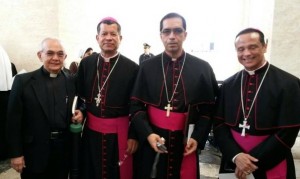
Bishop Jesús Delgado, third in line from the Archbishop of El Salvador and the leader of the effort to canonize the martyr Archbishop Oscar Arnulfo Romero, has been suspended from all his functions in the Catholic Church after confessing to having sexually abused a nine-year-old girl.
While the Catholic Church confirmed the news, it has not given details of the case. According to Salvadoran law, sexual abuse of minors including inappropriate touching and acts of sexual violation of a non-carnal nature are punishable by incarceration for eight to ten years.
“This denunciation is historic in our country. It is the first time that a case of this type has come to light. Other cases may exist, but the problem is that they have never been denounced because of the power of the Catholic Church. You can cause yourself problems by messing with them,” said Clelia Méndez, former prosecutor for the Department of Children and Women, former public defender and private attorney.
The Catholic Church felt obligated to hold an emergency press conference after Vanda Pignato, Secretary of Social Inclusion and former first lady, made public in a radio interview that she had received an accusation that an important bishop in the Archdiocese of El Salvador had committed sexual abuse.
“It hurts us that these situations happen. We ask pardon from the victim and we ask the faithful to pray for the church, for her priests, for the conversion of everyone. It is important that we all remain united,” said Bishop Rafael Urrutia, chancellor for the Salvadoran archbishop, in the press conference.
In a communiqué released by the Catholic Church after the news spread like wildfire on social networks, the Salvadoran Archbishop said that Delgado admitted that he had committed the abuses over the course of eight years and that he is prepared to meet with the victim who is now 42 years old to ask for her forgiveness.
Secretary Pignato warned in the conference that if the Catholic Church did not make a statement about the case, she would reveal the identity of the priest named by the victim.
“The victim sought out the Catholic Church, submitted her sworn statement and held on to the hope that something would be done. I understand that the bishop of San Salvador would go to the Vatican and return to take action on the issue,” said the Secretary of Social Inclusion in a radio interview.
Pignato said that the Catholic Church received the accusation at the end of October. However, nothing was done, and the accused bishop even traveled in a delegation to the Vatican to thank Pope Francis for the work he had done in the cause of canonizing the martyr Archbishop Oscar Romero.
The Catholic Church limited its action to distributing an official communiqué confirming the complaint and stating that Bishop Delgado had been suspended. At the orders of Church leadership, the communiqué said, the accused bishop had gone to a spiritual retreat to reflect deeply on his actions and the damage done to the victim.
Before the scandal, Bishop Delgado had been the vicar general of the Archdiocese of San Salvador, Episcopal Vicar of Education and Culture and media director for the Catholic Church in El Salvador. He was ordained priest in August 1962 and worked as Archbishop Romero’s private secretary.

Monsignor Urrutia said that a canonical procedure has been opened against Bishop Delgado and that he will be sanctioned with definite suspension from Catholic activities and from the entire process of the issue of Romero’s canonization.
Although the victim did report the crime to the Salvadoran Attorney General, Delgado will not face criminal prosecution because under Salvadoran law, sex crimes of this type are subject to a statute of limitations of ten years after the offense.
Benjamin Cuellar of the Institute of Human Law of the José Simeón Cañas (IDHUCA) described the case as “an aberrant crime, an abuse of power,” and said that this type of crime committed by important people in the country should be prosecuted.
Last year, when news spread of cases of pederasty committed by priests and bishops of the Catholic Church throughout the world, Pope Francis revealed that one out of every 50 priests has committed sexual abuse against children. The pope called sexual abuse a plague that has contaminated the Catholic Church.
The last notable case of sexual abuse committed by a Salvadoran cleric was that of Evangelical pastor Carlos Rivas, director of the International Revival Tabernacle (TAI). The victim, who was the pastor’s lover, accused the cleric of violence, sexual abuse and attempted rape.
However, legal action was abandoned because the pastor arrived at an agreement with the victim under whom he will pay her an undisclosed amount of money and she will drop the complaint.
Carmen Rodríguez is a journalist in San Salvador and has five years of experience in digital journalism. Her specialty is the theme of security and (judicial) and she has been a collaborator with the Program of the Americas since 2014.
Photos courtesy of the Archbishop of El Salvador, published during the visit of the bishops’ delegation to the Vatican in 2015.
Translation by Esther Klein Buddenhagen



